2001年春季高考英语试题及答案(北京、内蒙古、安徽卷)
- 格式:doc
- 大小:84.50 KB
- 文档页数:18
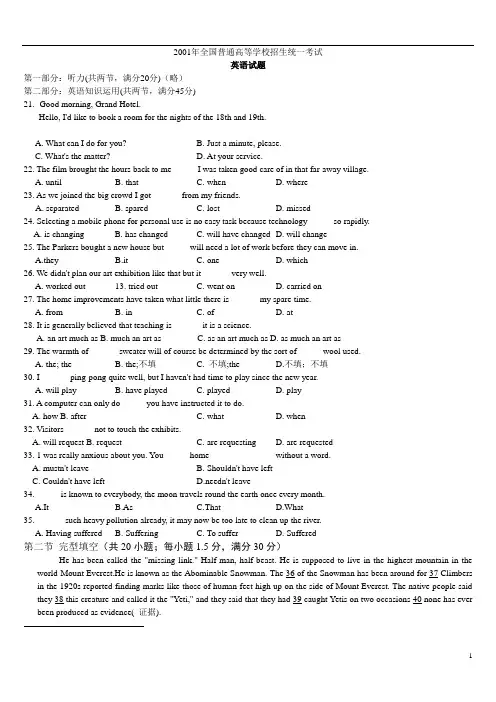
2001年全国普通高等学校招生统一考试英语试题第一部分:听力(共两节,满分20分)(略)第二部分:英语知识运用(共两节,满分45分)21.- Good morning, Grand Hotel.-Hello, I'd like to book a room for the nights of the 18th and 19th.-_______A. What can I do for you?B. Just a minute, please.C. What's the matter?D. At your service.22. The film brought the hours back to me _____ I was taken good care of in that far-away village.A. untilB. thatC. whenD. where23. As we joined the big crowd I got ______ from my friends.A. separatedB. sparedC. lostD. missed24. Selecting a mobile phone for personal use is no easy task because technology _____ so rapidly.A. is changingB. has changedC. will have changedD. will change25. The Parkers bought a new house but _____ will need a lot of work before they can move in.A.theyB.itC. oneD. which26. We didn't plan our art exhibition like that but it ______ very well.A. worked out 13. tried out C. went on D. carried on27. The home improvements have taken what little there is ______ my spare time.A. fromB. inC. ofD. at28. It is generally believed that teaching is ______ it is a science.A. an art much asB. much an art asC. as an art much asD. as much an art as29. The warmth of ______ sweater will of course be determined by the sort of _____ wool used.A. the; theB. the;不填C. 不填;theD.不填;不填30. I ______ ping-pong quite well, but I haven't had time to play since the new year.A. will playB. have playedC. playedD. play31. A computer can only do _____ you have instructed it to do.A. howB. afterC. whatD. when32. Visitors ______ not to touch the exhibits.A. will requestB. requestC. are requestingD. are requested33. 1 was really anxious about you. You _____ home without a word.A. mustn't leaveB. Shouldn't have leftC. Couldn't have leftD.needn't leave34. _____ is known to everybody, the moon travels round the earth once every month.A.ItB.AsC.ThatD.What35. ______ such heavy pollution already, it may now be too late to clean up the river.A. Having sufferedB. SufferingC. To sufferD. Suffered第二节完型填空(共20小题;每小题1.5分,满分30分)He has been called the "missing link." Half-man, half-beast. He is supposed to live in the highest mountain in the world-Mount Everest.He is known as the Abominable Snowman. The 36 of the Snowman has been around for 37 Climbers in the 1920s reported finding marks like those of human feet high up on the side of Mount Everest. The native people said they 38 this creature and called it the "Yeti," and they said that they had 39 caught Yetis on two occasions 40 none has ever been produced as evidence( 证据).Over the years, the story of the Yetis has 41 . In 1951, Eric Shipton took photographs of a set of tracks in the snow ofEverest. Shipton believed that they were not 42 the tracks of a monkey or bear and 43 that the Abominable Snowman might really 44.Further efforts have been made to find out about Yetis. But the only things people have ever found were 45 footprints.Most believe the footprints are nothing more than 46 animal tracks, which had been made 47 as they melted (融化) and refroze in the snow. 48 in 1964, a Russian scientist said that the Abominable Snowman was 49 and was a remaining link with the prehistoric humans. But, 50 , no evidence has ever 51 been produced.These days, only a few people continue to take the story of the Abominable Snowman 52 . But if they ever 53 catching one, they may face a real 54 Would they put it in a 55 or give it a room in a hotel?36. A. event B. story C. adventure D. description37. A. centuries B. too long C. some time D. many years38. A. heard from B. cared for C. knew of D. read about39.A. even B. hardly C. certainly D. probably40. A. as B. though C. when D. until41.A.developed B. changed C. occurred D. continued42. A. entirely B. naturally C. clearly D. simply43. A. found B. declared C. felt D. doubted44. A. exist B. escape C. disappear D. return45.A.clearer B. more C. possible D. rare46. A. huge B. recent C. ordinary D. frightening47.A.strange B. large C. deep D. rough48.A. In the end B. Therefore C. After all D. However49. A. imagined B. real C. special D. familiar50. A. so B. besides C. again D. instead51. A. rightly B. actually C. normally D. particularly52. A. lightly B. jokingly C. seriously D. properly53. A. succeed in B. insist on C. depend on D. join in54. A. decision B. situation C. subject D. problem55. A. zoo B. mountain C. museum D. laboratory第三部分:阅读理解(共20小题;每小题2.5分,满分50分)阅读下列短文,从每题所给的四个选项(A、B、C和D)中,选出最佳选项,并在答题卡上将该项涂黑。
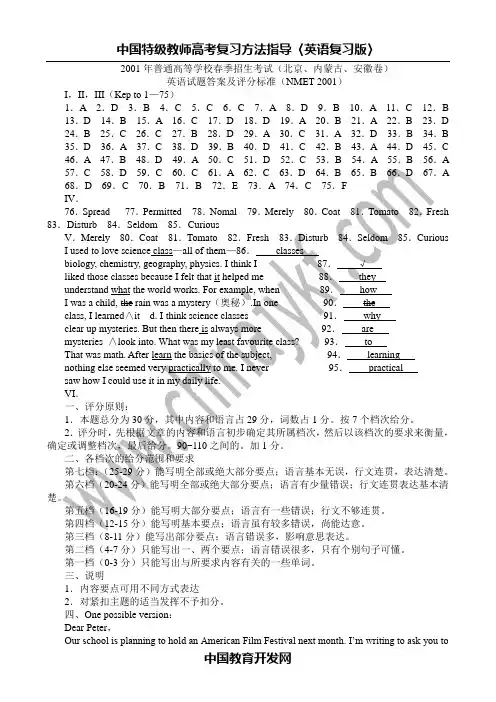
2001年普通高等学校春季招生考试(北京、内蒙古、安徽卷)英语试题答案及评分标准(NMET 2001)I,II,III(Kep to 1—75)1.A 2.D 3.B 4.C 5.C 6.C 7.A 8.D 9.B 10.A 11.C 12.B 13.D 14.B 15.A 16.C 17.D 18.D 19.A 20.B 21.A 22.B 23.D 24.B 25.C 26.C 27.B 28.D 29.A 30.C 31.A 32.D 33.B 34.B 35.D 36.A 37.C 38.D 39.B 40.D 41.C 42.B 43.A 44.D 45.C 46.A 47.B 48.D 49.A 50.C 51.D 52.C 53.B 54.A 55.B 56.AA83第二档(4-7分)只能写出一、两个要点;语言错误很多,只有个别句子可懂。
第一档(0-3分)只能写出与所要求内容有关的一些单词。
三、说明1.内容要点可用不同方式表达2.对紧扣主题的适当发挥不予扣分。
四、One possible version:Dear Peter,Our school is planning to hold an American Film Festival next month. I’m writing to ask you tocome and give a talk on American films and filmmaking industry. It will help us understand how the industry has developed into big business as it is today. This understanding should go a long was toward increasing their knowledge of American culture in general. Do yiou think one and a half hours will be enough? Please let me know as soon as possible so that I can make arrangements.I’m looking forward to seeing you and enjoying the talk.With best wishes,Y ours,Li Hua。
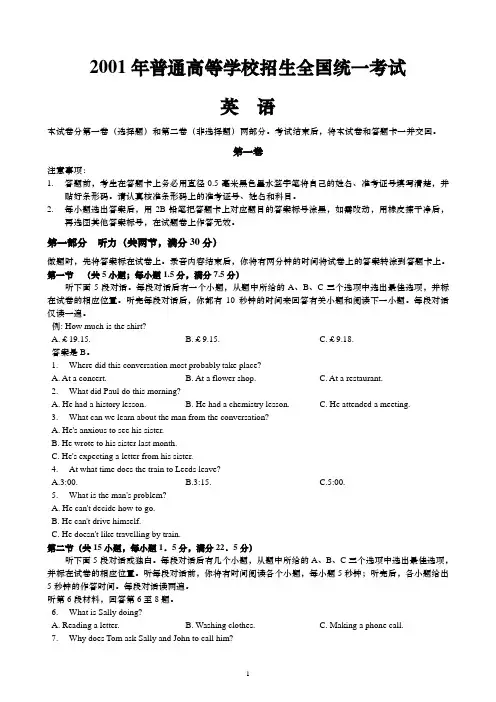
2001年普通高等学校招生全国统一考试英语本试卷分第一卷(选择题)和第二卷(非选择题)两部分。
考试结束后,将本试卷和答题卡一并交回。
第一卷注意事项:1.答题前,考生在答题卡上务必用直径0.5毫米黑色墨水签字笔将自己的姓名、准考证号填写清楚,并贴好条形码。
请认真核准条形码上的准考证号、姓名和科目。
2.每小题选出答案后,用2B铅笔把答题卡上对应题目的答案标号涂黑,如需改动,用橡皮擦干净后,再选图其他答案标号,在试题卷上作答无效。
第一部分听力(共两节,满分30分)做题时,先将答案标在试卷上。
录音内容结束后,你将有两分钟的时间将试卷上的答案转涂到答题卡上。
第一节(共5小题;每小题1.5分,满分7.5分)听下面5段对话。
每段对话后有一个小题,从题中所给的A、B、C三个选项中选出最佳选项,并标在试卷的相应位置。
听完每段对话后,你都有10秒钟的时间来回答有关小题和阅读下一小题。
每段对话仅读一遍。
例: How much is the shirt?A.£19.15.B.£9.15.C.£9.18.答案是B。
1.Where did this conversation most probably take place?A. At a concert.B. At a flower shop.C. At a restaurant.2.What did Paul do this morning?A. He had a history lesson.B. He had a chemistry lesson.C. He attended a meeting.3.What can we learn about the man from the conversation?A. He's anxious to see his sister.B. He wrote to his sister last month.C. He's expecting a letter from his sister.4.At what time does the train to Leeds leave?A.3:00.B.3:15.C.5:00.5.What is the man's problem?A. He can't decide how to go.B. He can't drive himself.C. He doesn't like travelling by train.第二节(共15小题,每小题1.5分,满分22.5分)听下面5段对话或独白。
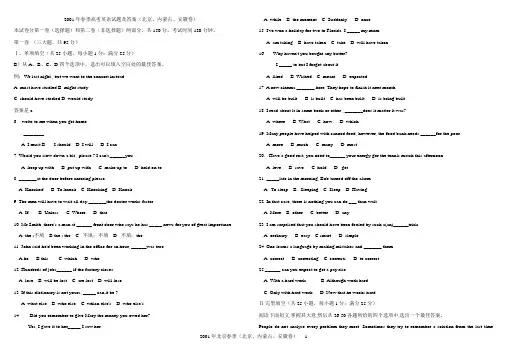
2001年春季高考英语试题及答案(北京、内蒙古、安徽卷)本试卷分第一卷(选择题)和第二卷(非选择题)两部分,共150分,考试时间120分钟。
第一卷(三大题,共95分)Ⅰ、单项填空(共25小题,每小题1分;满分25分)B)从A、B、C、D四个选项中,选出可以填入空白处的最佳答案。
例:We last night , but we went to the concert instead.A. must have studiedB. might studyC. should have studiedD. would study答案是c6. --write to me when you get home.-- ________.A. I mustB. I should D. I will D. I can7. Would you slow down a bit , please ? I can't ______you .A. keep up withB. put up withC. make up toD. hold on to8. _______at the door before cntering please.A. KnockedB. To knockC. KnockingD. Knock9. The men will have to wait all day _______the doctor works faster.A. IfB. UnlessC. WhereD. that10. Mr Smith ,there's a man at ______ front door who says he has _____ news for you of great importance.A. the ;不填B.the ; theC. 不填;不填D. 不填;the11. John said he'd been working in the office for an hour, ______was true.A.heB.thisC. whichD. who12. Hundreds of jobs______ if the factory closes.A. loseB. will be lostC. are lostD. will lose13. If this dictionary is not yours, _____ can it be ?A. what elseB. who elseC. whicn else'sD. who else's14. -----Did you remember to give Mary the money you owed her?----Y es,.I gave it to her_____ I saw her.A. whileB. the momentC. SuddenlyD. once15. I've won a holiday for two to Florida. I _____ my mum.A. am takingB. have takenC. takeD. will have taken16. ----Why haven't you bought any butter?----- I _____ to but I forgot about it.A. likedB. WishedC. meantD. expected17. A new cinema _______ here. They hope to finish it next month.A. will be builtB. is builtC. has been builtD. is being built18. I read about it in some book or other , _______does it matter it was?A. whereB. WhatC. howD. which19. Many people have helped with canned food, however, the food bank needs ______for the poor.A. moreB. muchC. manyD. most20.Have a good rest, you need to______ your energy gor the tennis match this afternoon.A. leveB. saveC. hold D . get21. _____late in the morning, Bob turned off the alarm.A . To sleepB . Sleeping C. Sleep D. Having22. In that case, there is nothing you can do ___ than wait.A. MoreB. otherC. betterD. any23. I am surprised that you should have been fooled by such a(an)______trick.A. ordinaryB. easyC.smartD. simple24. One learns a language by making mistakes and _______ them.A. correctB. correctingC. correctsD. to correct25.______ can you expect to get a pay rise.A. With a hard workB. Although work hardC. Only with hard workD. Now that he works hardⅡ.完型填空(共25小题,每小题1分;满分25分)阅读下面短文,掌握其大意,然后从26-50各题所给的四个选项中,选出一个最佳答案。
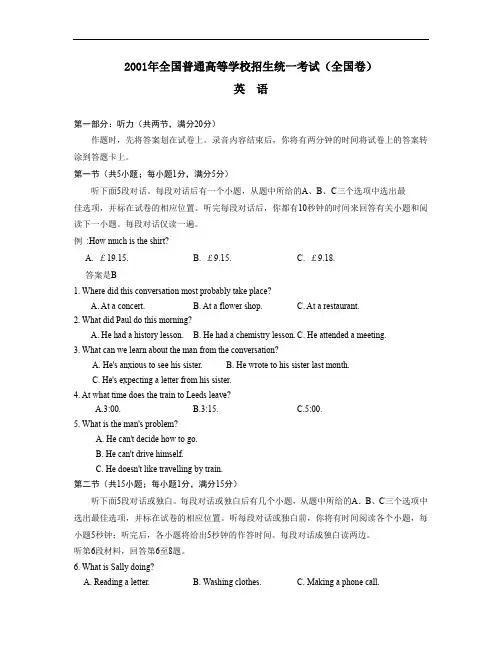
2001年全国普通高等学校招生统一考试(全国卷)英语第一部分:听力(共两节,满分20分)作题时,先将答案划在试卷上。
录音内容结束后,你将有两分钟的时间将试卷上的答案转涂到答题卡上。
第一节(共5小题;每小题1分,满分5分)听下面5段对话。
每段对话后有一个小题,从题中所给的A、B、C三个选项中选出最佳选项,并标在试卷的相应位置。
听完每段对话后,你都有10秒钟的时间来回答有关小题和阅读下一小题。
每段对话仅读一遍。
例:How much is the shirt?A. £19.15.B. £9.15.C. £9.18.答案是B1. Where did this conversation most probably take place?A. At a concert.B. At a flower shop.C. At a restaurant.2. What did Paul do this morning?A. He had a history lesson.B. He had a chemistry lesson.C. He attended a meeting.3. What can we learn about the man from the conversation?A. He's anxious to see his sister.B. He wrote to his sister last month.C. He's expecting a letter from his sister.4. At what time does the train to Leeds leave?A.3:00.B.3:15.C.5:00.5. What is the man's problem?A. He can't decide how to go.B. He can't drive himself.C. He doesn't like travelling by train.第二节(共15小题;每小题1分,满分15分)听下面5段对话或独白。
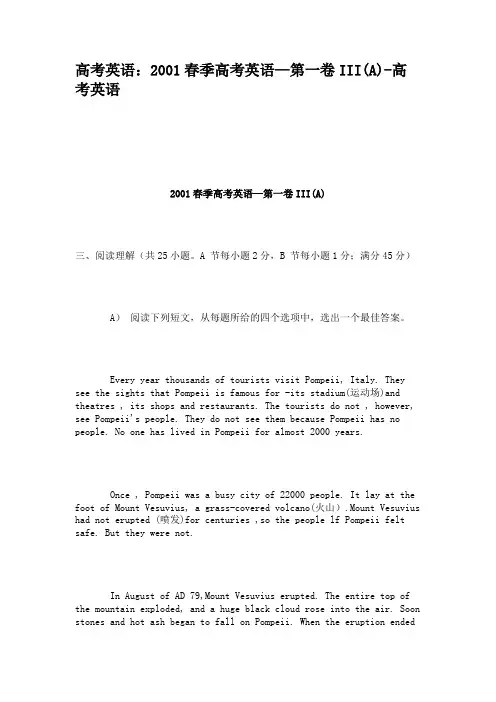
高考英语:2001春季高考英语—第一卷III(A)-高考英语2001春季高考英语—第一卷III(A)三、阅读理解(共25小题。
A 节每小题2分,B 节每小题1分;满分45分)A)阅读下列短文,从每题所给的四个选项中,选出一个最佳答案。
Every year thousands of tourists visit Pompeii, Italy. They see the sights that Pompeii is famous for -its stadium(运动场)and theatres , its shops and restaurants. The tourists do not , however, see Pompeii's people. They do not see them because Pompeii has no people. No one has lived in Pompeii for almost 2000 years.Once , Pompeii was a busy city of 22000 people. It lay at the foot of Mount Vesuvius, a grass-covered volcano(火山).Mount Vesuvius had not erupted (喷发)for centuries ,so the people lf Pompeii felt safe. But they were not.In August of AD 79,Mount Vesuvius erupted. The entire top of the mountain exploded, and a huge black cloud rose into the air. Soon stones and hot ash began to fall on Pompeii. When the eruption endedtwo days later, Pompeii was buried under 20 feet of stones and ashes. Almost all of its people were dead.For centuries, Pompeii lay buried under stone and ash. Then,in the year 1861, an Italian scientist named Ginseppe began to uncover Pompeii. Slowly, carefully, Ginseppe and his men dug. Thecity looked almost the same as it had looked in AD 79. There were streets and fountains, houses and shops. There was a stadium with 20000 seats. Perhaps the most important of all, there were everyday objects , which tell us a great deal about the people who lived in Pompeii. Many glasses and jars had some dark blue colour in the bottom, so we know that the people of Pompeii liked wine. They liked bread, too; metal bread pans were in every bakery. In one bakery there were 81 round , flat loaves of bread- a type of bread that is still sold in Italy today. Tiny boxes filled with a dark, shiny powder tell us that women liked to wear eye-makeup.Ginseppe has died , but his work continues. One-fourth has not been uncovered yet. Scientists are still digging, still making discoveries that draw the tourists to Pompeii.51. Why do large numbers of people come to Pompeii each year?A.TO visit the volcano.B. TO shop and eat there.C. To watch sports and plays.D. To see how Pompeiians lived.52. Why had so many Pompeiians remained by volcanic Mount Vesuvius?A. The city nearby offered all kinds of fun.B. The area produced the finest wine in Italy.C. Few people expected the volcano to erupt again.D. The mountain was beautiful and covered with grass.53. Why did the city uncovered look almost the same as it had looked in AD 79?A. Because Ginseppe and his men dug it slowly and carefully.B. Because the city was buried alive and remained untouched.C. Because scientists successfully rebuilt the city with everyday objects.D. Because nobody had lived in the city ever since the volcano erupted.54.What do we know about the Pompeiians who lived 2000 years ago?A. They lived more or less the same as Italians now do.B. They liked women wearing all kinds of makeup.C. They enjoyed a lazy life with drinking and eating.D. They went back to Pompeii after the eruption in AD 79.。
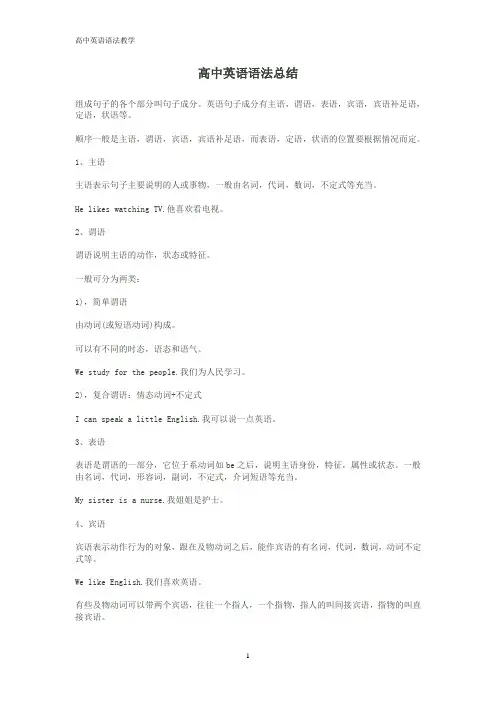
高中英语语法总结组成句子的各个部分叫句子成分。
英语句子成分有主语,谓语,表语,宾语,宾语补足语,定语,状语等。
顺序一般是主语,谓语,宾语,宾语补足语,而表语,定语,状语的位置要根据情况而定。
1、主语主语表示句子主要说明的人或事物,一般由名词,代词,数词,不定式等充当。
He likes watching TV.他喜欢看电视。
2、谓语谓语说明主语的动作,状态或特征。
一般可分为两类:1),简单谓语由动词(或短语动词)构成。
可以有不同的时态,语态和语气。
We study for the people.我们为人民学习。
2),复合谓语:情态动词+不定式I can speak a little English.我可以说一点英语。
3、表语表语是谓语的一部分,它位于系动词如be之后,说明主语身份,特征,属性或状态。
一般由名词,代词,形容词,副词,不定式,介词短语等充当。
My sister is a nurse.我姐姐是护士。
4、宾语宾语表示动作行为的对象,跟在及物动词之后,能作宾语的有名词,代词,数词,动词不定式等。
We like English.我们喜欢英语。
有些及物动词可以带两个宾语,往往一个指人,一个指物,指人的叫间接宾语,指物的叫直接宾语。
He gave me some ink.他给了我一点墨水。
有些及物动词的宾语后面还需要有一个补足语,意思才完整,宾语和它的补足语构成复合宾语。
如:We make him our monitor.我们选他当班长。
5、定语在句中修饰名词或代词的成分叫定语。
用作定语的主要是形容词,代词,数词,名词,副词,动词不定式,介词短语等。
形容词,代词,数词,名词等作定语时,通常放在被修饰的词前面。
He is a new student.他是个新生。
但副词,动词不定式,介词短语等作定语时,则放在被修饰的词之后。
The bike in the room is mine.房间里的自行车是我的。
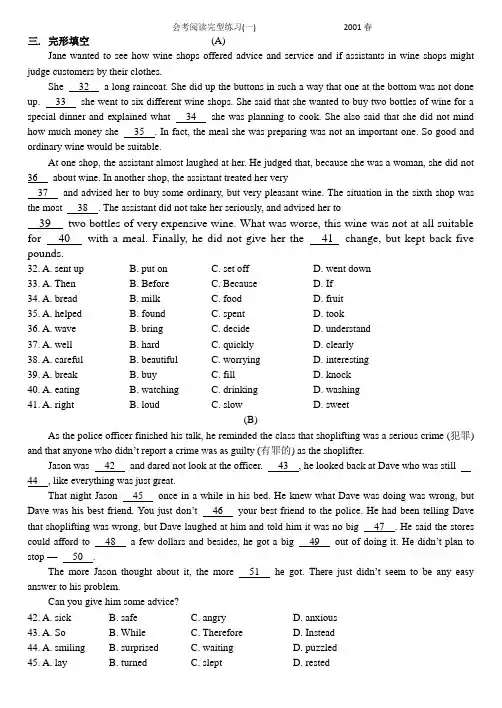
三. 完形填空(A)Jane wanted to see how wine shops offered advice and service and if assistants in wine shops might judge customers by their clothes.She 32 a long raincoat. She did up the buttons in such a way that one at the bottom was not done up. 33 she went to six different wine shops. She said that she wanted to buy two bottles of wine for a special dinner and explained what 34 she was planning to cook. She also said that she did not mind how much money she 35 . In fact, the meal she was preparing was not an important one. So good and ordinary wine would be suitable.At one shop, the assistant almost laughed at her. He judged that, because she was a woman, she did not36 about wine. In another shop, the assistant treated her very37 and advised her to buy some ordinary, but very pleasant wine. The situation in the sixth shop was the most 38 . The assistant did not take her seriously, and advised her to39 two bottles of very expensive wine. What was worse, this wine was not at all suitable for 40 with a meal. Finally, he did not give her the 41 change, but kept back five pounds.32. A. sent up B. put on C. set off D. went down33. A. Then B. Before C. Because D. If34. A. bread B. milk C. food D. fruit35. A. helped B. found C. spent D. took36. A. wave B. bring C. decide D. understand37. A. well B. hard C. quickly D. clearly38. A. careful B. beautiful C. worrying D.interesting39. A. break B. buy C. fill D. knock40. A. eating B. watching C. drinking D. washing41. A. right B. loud C. slow D. sweet(B)As the police officer finished his talk, he reminded the class that shoplifting was a serious crime (犯罪) and that anyone who didn’t report a crime was as guilty (有罪的) as the shoplifter.Jason was 42 and dared not look at the officer.43 , he looked back at Dave who was still44 , like everything was just great.That night Jason 45 once in a while in his bed. He knew what Dave was doing was wrong, but Dave was his best friend. You just don’t 46 your best friend to the police. He had been telling Dave that shoplifting was wrong, but Dave laughed at him and told him it was no big 47. He said the stores could afford to 48 a few dollars and besides, he got a big 49 out of doing it. He didn’t plan to stop ––50 .The more Jason thought about it, the more 51 he got. There just didn’t seem to be any easy answer to his problem.Can you give him some advice?42. A. sick B. safe C. angry D. anxious43. A. So B. While C. Therefore D. Instead44. A. smiling B. surprised C. waiting D. puzzled45. A. lay B. turned C. slept D. rested46. A. tell B. sell C. report D. introduce47. A. share B. custom C. deal D. bargain48. A. save B. offer C. pay D. lose49. A. value B. kick C. prize D. price50. A. ever B. never C. yet D. even51. A. worn-out B. ill-treated C. mixed-up D. over-excited四. 阅读理解A)What is a bird?Any animal that has feathers is a bird. All birds have two wings and two legs. Modern birds have no teeth, but they have a hard mouth part. It helps them catch and eat their food. All she-birds lay eggs, and most birds build their homes. Birds —like people —are ―warm-blooded‖. Their body temperature stays about the same no matter how hot or cold the air is.Why do birds have feathers?Feathers help a bird to keep warm. In cold weather, their feathers act as a blanket by holding in body heat. In warm weather, a bird squeezes (挤) its feathers against its body to let body heat escape.Feathers also help a bird to fly. While flying, a bird uses its outer wing feathers to move forward in the air. Wing feathers and tail feathers are used to keep balance (平衡).What do birds eat?Different kinds of birds eat different kinds of food. Usually birds have favorite foods, but will eat some other things, too. Many birds like worms and insects (虫) best. Birds that live near water often eat fish. Some birds eat meat — snakes, smaller birds, and other animals. Some birds eat fruit. Many small birds live on seeds.Now you know more about birds.52. What is the passage about?A. Feathers.B. Birds.C. Food.D. Weather.53. Modern birds have a hard mouth part to help them ______.A. fly in the skyB. take a restC. run on the groundD. catch and eat their food54. If weather changes, bir ds’ temperature ______.A. stays about the sameB. changes a lotC. goes downD. comes down55. Birds have feathers ______ in cold weather.A. to keep them warmB. to wash their facesC. to move fastD. to keep young56. Birds that live near water often eat ______.A. fishB. insectsC. snakesD. fruit57. Many small birds live on _______.A. grassB. seedsC. flowersD. waterC)In most societies, schools are set up to help young people learn the skills, and get knowledge and values which will help them to live full and worthwhile lives. Students are expected to do as well as they can in allthe subjects they study. They are also expected to follow certain rules of behavior.PUNCTUALITYYou are expected to be on time for all subject classes.Punctuality shows consideration for other people’s feelings. If you are late for class, you interrupt the teacher and the class.Punctuality is a good habit that will be expected of you both on the job and in your personal relationships.Sometimes lateness, if not quite often, can be excused. If you are repeatedly late, however, you will be asked to make up time either with your teachers or in the office. Your parents will also be advised of this and asked to assist the school in helping you to be punctual.REGULAR ATTENDANCEYou are expected to attend school regularly and to attend all your classes when you are at school.If you have to leave the school during the day or if you feel unwell, you are to report to the office. You will need a note signed by a parent to excuse you from school. If you are feeling sick, your parents may be asked to pick you up or you may be signed into the health room. The teachers are not allowed to give out medication, e.g. aspirin.If you are absent from school and the teacher has not been able to keep in touch with a parent on the day of your absence, you are expected to bring a note, signed by a parent, to your home room teacher explaining your absence.Good attendance is important if you are to be successful in school.Missing classes affects not only your progress but the progress of the rest of the class as well. Your parents are interested in your success in schooling and, therefore, in your attendance at school. We want to be sure that your parents are informed when you are absent from school. For that reason, we insist on communication with the home when you are not here.Sometimes students miss classes because they are experiencing failure rather than success. Running away from any problem offers comfort only for a short period of time. If you are having difficulty in a subject, talk with your teacher.If you are absent from a class without permission, you will be asked to make up time with your subject teacher.If you miss more than one class, you will be referred to the head of the department of the subject you have missed. Your parents may be notified of your absence by the teacher or the department head.If you continue to miss the classes, you will be referred to the headmaster, who will call your parents.60. The passage is mainly about _______.A. the rules of behavior for studentsB. the results of the students’ misbehaviorC. the reports of behavior for students at schoolD. the reasons for expected behavior for students61. Which of the following is TRUE according to the passage?A. If you are late for school by accident, you need some excuse.B. If you are often late for class, you are asked to stay with the teacher.C. If you do not have the habit of punctuality, your parents will be asked to help you.D. If you are repeatedly late, you only need to make up time in the office.62. If you don’t feel well when you are in class, _____.A. you should stay in the classroom to keep good attendanceB. you should phone your parents and they will take you homeC. the teacher will give you some medicine in the health roomD. you may talk with the teacher and the office will deal with it63. Which of the following is a likely reason for students to be absent from school accordingto the passage?A. Parents pay too much attention to the students’ attendance at school.B. Some students intend to give up when they are facing trouble.C. The school insists on keeping in touch with the parents.D. Students are not interested in their attendance record.64. If you miss some classes without any reason, _____.A. the subject teacher will help you to make up timeB. the head of the department will talk with your subject teacherC. the headmaster will phone your parents and ask them to pick you upD. the teacher or the head of the department will talk with you and your parents。
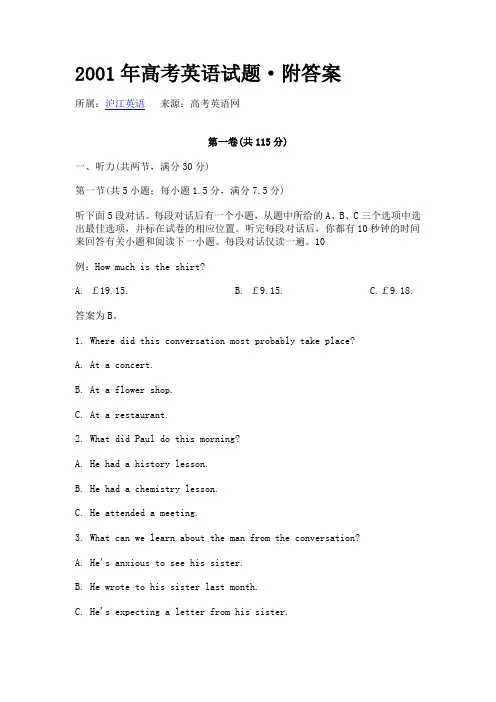
2001年高考英语试题·附答案所属:沪江英语来源:高考英语网第一卷(共115分)一、听力(共两节,满分30分)第一节(共5小题;每小题1.5分,满分7.5分)听下面5段对话。
每段对话后有一个小题,从题中所给的A、B、C三个选项中选出最佳选项,并标在试卷的相应位置。
听完每段对话后,你都有10秒钟的时间来回答有关小题和阅读下一小题。
每段对话仅读一遍。
10例:How much is the shirt?A. £19.15.B. £9.15.C.£9.18.答案为B。
1. Where did this conversation most probably take place?A. At a concert.B. At a flower shop.C. At a restaurant.2. What did Paul do this morning?A. He had a history lesson.B. He had a chemistry lesson.C. He attended a meeting.3. What can we learn about the man from the conversation?A. He's anxious to see his sister.B. He wrote to his sister last month.C. He's expecting a letter from his sister.4. At what time does the train to Leeds leave?A. 3:00.B. 3:15.C. 5:00.5. What is the man's problem?A. She can't decide how to go.B. He can't drive himself.C. He doesn't like travelling by train.第二节(共15小题;每小题1.5分,满分22.5分)听下面5段对话或独白。
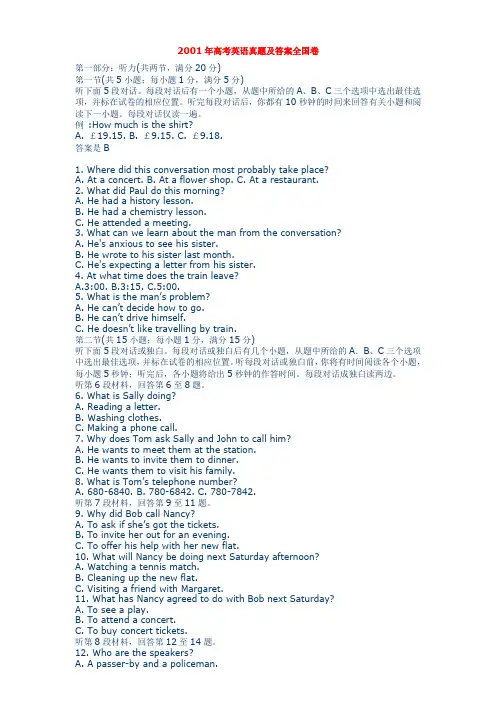
2001年高考英语真题及答案全国卷第一部分:听力(共两节,满分20分)第一节(共5小题;每小题1分,满分5分)听下面5段对话。
每段对话后有一个小题,从题中所给的A、B、C三个选项中选出最佳选项,并标在试卷的相应位置。
听完每段对话后,你都有10秒钟的时间来回答有关小题和阅读下一小题。
每段对话仅读一遍。
例:How much is the shirt?A. £19.15.B. £9.15.C. £9.18.答案是B1. Where did this conversation most probably take place?A. At a concert.B. At a flower shop.C. At a restaurant.2. What did Paul do this morning?A. He had a history lesson.B. He had a chemistry lesson.C. He attended a meeting.3. What can we learn about the man from the conversation?A. He's anxious to see his sister.B. He wrote to his sister last month.C. He's expecting a letter from his sister.4. At what time does the train leave?A.3:00.B.3:15.C.5:00.5. What is the man’s problem?A. He can’t decide how to go.B. He can’t drive himself.C. He doesn’t like travelling by train.第二节(共15小题;每小题1分,满分15分)听下面5段对话或独白。
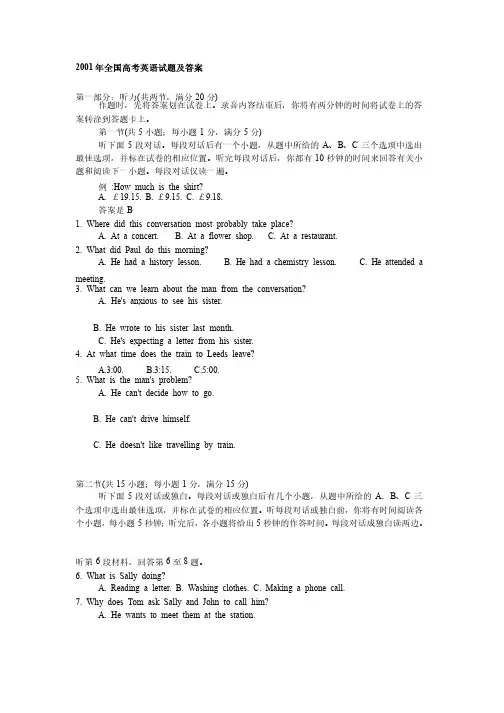
2001年全国高考英语试题及答案第一部分:听力(共两节,满分20分) 作题时,先将答案划在试卷上。
录音内容结束后,你将有两分钟的时间将试卷上的答案转涂到答题卡上。
案转涂到答题卡上。
第一节(共5小题;每小题1分,满分5分) 听下面5段对话。
每段对话后有一个小题,从题中所给的A 、B 、C 三个选项中选出最佳选项,并标在试卷的相应位置。
听完每段对话后,你都有10秒钟的时间来回答有关小题和阅读下一小题。
每段对话仅读一遍。
题和阅读下一小题。
每段对话仅读一遍。
例 :How much is the shirt? A. £19.15. B. £9.15. C. £9.18. 答案是B 1. Where did this conversation most probably take place? A. At a concert. B. At a flower shop.C. At a restaurant. 2. What did Paul do this morning? A. A. He He He had had had a a a history history history lesson. lesson. B. B. He He He had had had a a a chemistry chemistry chemistry lesson. lesson. C. C. He He He attended attended attended a a meeting. 3. What can we learn about the man from the conversation? A. He's anxious to see his sister. B. He wrote to his sister last month. C. He's expecting a letter from his sister. 4. At what time does the train to Leeds leave? A.3:00. B.3:15. C.5:00. 5. What is the man's problem? A. He can't decide how to go. B. He can't drive himself. C. He doesn't like travelling by train. 第二节(共15小题;每小题1分,满分15分) 听下面5段对话或独白。
绝密★启用前2001年普通高等学校招生全国统一考试(听力占20%)英语本试卷分第一卷(选择题)和第二卷(非选择题)两部分。
第一卷1至14页。
第二卷1至4页。
共150分。
考试时间120分钟。
第一卷(三部门,共115分)注意事项:1.答第一卷前,考生务必将自己的姓名、准考证号、考试科目用铅笔涂写在答题卡上。
2.每小题选出答案后,用铅笔把答题卡上对应题目的答案标号涂黑。
如需改动,用橡皮擦干净后,再选涂其他答案标号。
不能答在试卷上。
3.考试结束,考生将本试卷和答题卡一并交回。
听力试题第一部分:听力(共两节,满分30分)作题时,先将答案划在试卷上。
录音内容结束后,你将有两分钟的时间将试卷上的答案转涂到答题卡上。
第一节(共5小题;每小题1.5分,满分7.5分)听下面5段对话。
每段对话后有一个小题,从题中所给的A、B、C三个选项中选出最佳选项,并标在试卷的相应位置。
听完每段对话后,你都有10秒钟的时间来回答在关小题和阅读下一小题。
每段对话仅读一遍。
例:How much is the shirt ?A.£19.15 B.£9.15 C.£9.18答案是B。
1.Where did this conversation most probably take place ?A.At a concert . B.At a flower shop . C.At a restaurant . 2.What did Paul do this moming ?A.He had a history lsson . B.He had a chemistry lesson .C.He attended a mecting .3.What can we lean about the man from the conversation ?A.He’s anxious to see his sister .B.He wrote to his sister last month.C.He’s expecting a letter from his sister .4.At what time does the train to Leeds leave ?A.3:00 B.3:15 C.5:005.W hat is the man’s problem?A.He can’t decide how to go .B.He can’t drive himself .C.H e doesn’t like traveling by train .第二节(共15小题,每小题1.5分,满分22.5分)听下面5段对话或独白。
高考英语:2001春季高考英语—第一卷III(B)-高考英语2001春季高考英语—第一卷III(B)BWhen I was a boy, I belonged to the Boy Scouts(童子军),so I used to go camping every summer ,and once something happened which I have never been able to explain.We were camping in a place above a river. After arriving, we all rushed down to the river and had a swim. Standing by the river, we noticed that it was surrounded(环绕)by cliffs(悬崖).If someone wanted to reach the river at this point, he had to past our camp.Several days later, the scoutmaster had to be away for a day. That afternoon, we had supper early. We were sitting round the fire, eating and talking, when a man walked past and went down towards the river. We all felt that this man looked very strange, but, because each of us was afraid of looking very stupid, no one said anything.We ate rather slowly, taking as long as possible. After finishing, we collected our plates together so that we could takethem to the river where we always washed them. But no one moved towards the river -we stood looking at each other ashamed. Then all shouting at once, we began talking about the man who had walked past us. We agreed how strange he looked and we wondered what he could be doing by the river. We knew that he could only return by passing through our camp.An hour passed. Then one of the boys suggested we shouldcreep(悄悄移动)down by the river so that we could see what the man was doing. Moving very slowly and keeping in the shadow, we crept down towards the bank. One boy climbed a tree so that he could see everything clearly. He called to us that there was no one there, so we ran down to the bank, looking everywhere carefully. We could not understand where the man had gone.When it got dark , we went back to our camp feeling bewildered. We told the scoutmaster what had happened in the evening. Smiling, he doubted that we had seen the man , but finally suggested we go and look again. We did, but there was no one there.Many years have passed, but I still remember it as if it were yesterday. What did we see? I do not know.55. The writer in the text mainly tells us .A. the story of his childhoodB. a strange camping experienceC. about a stranger by the riverD. about a good place for camping56. Why did the boys eat their supper slowly?A. They wanted to delay going to the river bank.B. They were waiting for their scoutmaster.C. They had a supper earlier than usual .D. They were talking while eating.57. The word "bewildered" in the text probably means .A. ashamedB. nervousC. unable to understandD. eager to know something58. When he heard what had happened, the scoutmaster .A. realized who the man wasB. started to worry about the manC. went back to look for the manD. felt it hard to believe the boys59. The writer still remembers the event because .A. the boys acted foolishlyB. the camping place is beautifulC. there has been no explanation for the eventD. he particularly enjoyed his camping that summer。
第一卷(共115分)一、听力(共两节,满分30分)第一节(共5小题;每小题1.5分,满分7.5分)听下面5段对话。
每段对话后有一个小题,从题中所给的A、B、C三个选项中选出最佳选项,并标在试卷的相应位置。
听完每段对话后,你都有10秒钟的时间来回答有关小题和阅读下一小题。
每段对话仅读一遍。
例:How much is the shirt?A. £19.15.B. £9.15.C.£9.18.答案为B。
1. Where did this conversation most probably take place?A. At a concert.B. At a flower shop.C. At a restaurant.2. What did Paul do this morning?A. He had a history lesson.B. He had a chemistry lesson.C. He attended a meeting.3. What can we learn about the man from the conversation?A. He’s anxious to see his sister.B. He wrote to his sister last month.C. He’s expecting a letter from his sister.4. At what time does the train to Leeds leave?A. 3:00.B. 3:15.C. 5:00.5. What is the man’s problem?A. He can’t decide how to go.B. He can’t drive himself.C. He doesn’t like travelling by train.第二节(共15小题;每小题1.5分,满分22.5分)听下面5段对话或独白。
2001年普通高等学校春季招生考试物 理(北京、内蒙古、安徽卷)一、选择题本题共10小题;每小题4分,共40分.在每小题给出的四个选项中,有的小题只有一个选项正确,有的小题有多个选项正确.全部选对的得4分,选不全的得2分,有选错或不答的得0分.1.如图所示,两根相同的轻弹簧1S 、2S ,劲度系数皆为m N k /1042⨯=.悬挂的重物的质量分别为kg m kg m 4221==和.若不计弹簧质量,取2/10s m g =,则平衡时弹簧1S 、2S的伸长量分别为 A .cm 5、10cm B .10cm 、cm 5 C .15cm 、10cm D .10cm 、15cm 答案:C2.下列现象中,与原子核内部变化有关的是A .α粒子散射B .光电效应C .天然放射现象D .原子发光现象 答案:C3.下列说法中正确的是A .物体的分子热运动动能的总和就是物体的内能B .对于同一种气体,温度越高,分子平均动能越大C .要使气体的分子平均动能增大,外界必须向气体传热D .一定质量的气体,温度升高时,分子间的平均距离一定增大 答案:B4.初速为0v 的电子,沿平行于通电长直导线的方向射出,直导线中电流方向与电子的初始运动方向如图所示,则A .电子将向右偏转,速率不变B .电子将向左偏转,速率改变C .电子将向左偏转,速率不变D .电子将向右偏转,速率改变 答案:A5.一定质量的理想气体经过一系列过程,如图所示.下列说法中正确的是A .b a →过程中,气体体积增大,压强减小B .c b →过程中,气体压强不变,体积增大C .a c →过程中,气体压强增大,体积变小D .a c →过程中,气体内能增大,体积不变 答案:AD6.将物体以一定的初速度竖直上抛.若不计空气阻力,从抛出到落回原地的整个过程中,下列四个图线中正确的是答案:BC7.一平行板电容器,两板之间的距离d 和两板面积S 都可以调节,电容器两板与电池相连接.以Q 表示电容器的电量,E 表示两极板间的电场强度,则 A .当d 增大、S 不变时,Q 减小、E 减小 B .当S 增大、d 不变时,Q 增大、E 增大 C .当d 减小、S 增大时,Q 增大、E 增大D .当S 减小、d 减小时,Q 不变、E 不变 答案:AC8.在如图所示的电路中,电容器C 的上极板带正电.为了使该极板仍带正电且电量增大,下列办法中可 采用的是A .增大1R ,其他电阻不变B .增大2R ,其他电阻不变C .增大3R ,其他电阻不变D .增大4R ,其他电阻不变 答案:AD9.有一列沿水平绳传播的简谐横波,频率为10Hz ,振动方向沿竖直方向.当绳上的质点P 到达其平衡位置且向下运动时,在其右方相距m 6.0处的质点Q 刚好到达最高点.由此可知波速和传播方向可能是 A .s m /8,向右传播 B .s m /8,向左传播 C .s m /24,向右传播 D .s m /24,向左传播答案:BC10.一物体放置在倾角为θ的斜面上,斜面固定于加速上升的电梯中,加速度为a ,如图所示.在物体始终相对于斜面静止的条件下, 下列说法中正确的是A .当θ一定时,a 越大,斜面对物体的正压力越小B .当θ一定时,a 越大,斜面对物体的摩擦力越大C .当a 一定时,θ越大,斜面对物体的正压力越小D .当a 一定时,θ越大,斜面对物体的摩擦力越小答案:BC二、填空题 本题共3小题;每小题5分,共15分。
2001年普通高等学校招生全国统一考试英语本试卷分第一卷(选择题)和第二卷(非选择题)两部分。
共150分。
考试时间120分钟。
第一卷(三部分,共115分)第一部分:听力(共两节,满分30分)略第二部分:英语知识运用(共两节,满分45分)第一节:单项填空(共15小题;每小题1分,满分15分)从A、B、C、D四个选项中,选出可以真入空白处的最佳选项,并在答题卡上将该项涂黑。
例:It is generally considered unwise to give a child_________he or she wants.A. howeverB. whateverC. whicheverD. whenever答案是B。
21. ---Good morning, Grand Hotel.---Hello, I’d like to book a room fro the nights of the 18th and 19th.---_________A. What can I do for you?B. Just a minute, please.C. What’s the matter? C. At your service.22. The film brought th ehours back to me_________ I was taken good care ofin that far-away village.A. untilB. thatC. whenD. where23. As we joined the big crowd I got_________from my friends.A. separatedB. sparedC. lostD. missed24. Selecting a mobile phone for personal use is no easy task becausetechnology_________so rapidly.A. is changingB. has changedC. will have changedD. will change25. The Parkers bought a new house but_________will need a lot of work before they can move in.A. theyB. itC. oneD. which26. We didn’t plan our art exhibition like that but it _________very well.A. worked outB. tried outC. went onD. carried on27. The home improvements have taken what little there is_________my spare time.A. fromB. inC. ofD. at28. It is generally believed that reaching is_________it is a science.A. an art much asB. much an art asC. as an art much asD. as much an art as29. The warmth of_________sweater will of course be determined by the sortof_________wool used.A. the; theB. the;/C. /; theD. /; /30. I _________ping-pong quite well, but I haven’t had time to play since th enew year.A. will playB. have playedC. playedD. play31. A computer can only do_________you have instructed it to do.A. howB. afterC. whatD. when32. Visitors_________not to touch the exhibits.A. will requestB. request .C. are requestiongD. are requested33. I was really anxious about you. You_________home without a word.A. mustn’t leaveB. shouldn’t have leftC. couldn’t have leftD. needn’t leave34. _________is known to everybody, the moon travels round the earth once every month.A. itB. AsC. ThatD. What35. _________such heavy pollution already, it may now be too late to clean up the river.A. Having sufferedB. SufferingC. To sufferD. Suffered第二节:完形填空(共20小题;每小题1.5分,满分30分)阅读下面短文,掌握其大意,然后人36-55各题所给的四个选项(A、B、C和D)中,选出最佳选项,并在答题卡将该项涂黑。
选校网高考频道专业大全历年分数线上万张大学图片大学视频院校库2001年春季高考英语试题及答案(北京、内蒙古、安徽卷)我爱英语网 本试卷分第一卷(选择题)和第二卷(非选择题)两部分,第一卷1-14页,第二卷1-4页。
共150分,考试时间120分钟。
第一卷(三大题,共95分)Ⅰ、单项填空(共25小题,每小题1分;满分25分)A)从A、B、C、D中找出其划线部分与所给单词的划线部分读音相同的选项例:haveA. gaveB. saveC. hatD. made1. combA. doubtB.troubleC. clubb2. cousinA. oughB.ploughC.JuneD.rush3. worthyA.healthB.furtherC.clothD.through4.curtainA.fruitB.orderC.firmD.nervous5. heightA.eightB.ceilingC.fihgtD.liftB)从A、B、C、D四个选项中,选出可以填入空白处的最佳答案。
例:We last night , but we went to the concert instead.A. must have studiedB. might studyC. should have studiedD. would study答案是c6. --write to me when you get home.-- .A. I mustB. I shouldD. I will D. I can7. Would you slow down a bit , please ? I can't you .A. keep up withB. put up withC. make up toD. hold on to8. at the door before cntering please.A. KnockedB. To knockC. KnockingD. Knock9. The men will have to wait all day the doctor works faster.A. ifB. unlessC. whereD. that10. Mr Smith ,there's a man at front door who says he has news for you of great importance.A. the ;不填B.the ; theC. 不填;不填D. 不填;the11. John said he'd been working in the office for an hour, was true.A.heB.thisC. whichD. who12. Hundreds of jobs if the factory closes.A. loseB. will be lostC. are lostD. will lose13. If this dictionary is not yours, can it be ?A. what elseB. who elseC. whicn else'sD. who else's14. -Did you remember to give Mary the money you owed her?-Yes,.I gave it to her I saw her.A. whileB. the momentC. suddenlyD. once15. I've won a holiday for two to Florida. I my mum.A. am takingB. have takenC. takeD. will have taken16. -Why haven't you bought any butter?- I to but I forgot about it.A. likedB. wishedC. meantD. expected17. A new cinema here. They hope to finish it next month.A. will be builtB. is builtC. has been builtD. is being built18. I read about it in some book or other , does it matter it was?A. whereB. whatC. howD. which19. Many people have helped with canned food, however, the food bank needs for the poor.A. moreB. muchC. manyD. most20.Have a good rest, you need to your energy gor the tennis match this afternoon.A. leve B . saveC. hold D . get21. late in the morning, Bob turned off the alarm.A . To sleepB . SleepingC. SleepD. Having22. In that case, there is nothing you can do ___ than wait.A. moreB. otherC. betterD. any23. I am surprised that you should have been fooled by such a(an)trick.A. ordinaryB. easyC.smartD. simple24. One learns a language by making mistakes and__ them.A. correctB. correctingC. correctsD. to correct25.__ can you expect to get a pay rise.A. With a hard workB. Although work hardC. Only with hard workD. Now that he works hardⅡ.完型填空(共25小题,每小题1分;满分25分)阅读下面短文,掌握其大意,然后从26-50各题所给的四个选项中,选出一个最佳答案。
People do not analyse every problem they meet. Sometimes they try to remember a solution from the last time they had a 26 problem. They often accept the opinion or ideas of other people. Other times they begin to act without 27 ;they try to find a solution by trial and error. 28 ,when all of these methods 29 ,the person with a problem has to start analysing. There are six 30 in analysing a problem.31 the person must recognise that th ere is a problem. For example,Sam‟s bicycle is broken, and he cannot ride it to class as he usually does. Sam must 32 that there is a problem with his bicycle.Next the person must 33 the problem. Before Sam can repair his bicycle, he must know why it does not work. For example, he must 34 the parts that are wrong.Now the person must look for 35 that will make the problem clearer and lead to 36 solutions. For example, suppose Sam 37 that his bike does not work because there is something wrong with the brakes. 38 he can look in his bicycle repair book and read about brakes, 39 his friends at the bike shop, or look at his brakes carefully.After 40 the problem, the person should have 41 suggestions for a possible solution. Take Sam as an example 42 , his suggestions might be: tighten or loosen the brakes; buy new brakes and change the old ones.In the end, one 43 seems to be the solution 44 the problem. Sometimes the 45 idea comes quite 46 because the thinker suddenly sees something in a 47 way. Sam ,for example, suddenly sees there is a piece of chewing gum(口香糖) stuck to a brake. He 48 hits on the solution to his problem: he must 49 the brake.Finally the solution is 50 . Sam does it and finds his bicycle works perfectly. In short he has solved the problem.26. A serious B usual C similar D common27. A practice B thinking C understanding D help28. A Besides B Instead C Otherwise D However29. A. fail B. work C. change D. develop30. A. ways B. conditions C. stages D. orders31. A. First B. Usually C. In general D. Most importantly32. A. explain B. prove C. show D. see33. A. judge B. find C. describe D. face34. A. check B. determine C. correct D. recover35. A. answers B. skills C. explanation D. information36. A. possible B. exact C. real D. special37. A. hopes B. argues C. decides D. suggests38. A. In other words B. Once in a whileC. First of allD. At this time39. A. look for B. talk to C. agree with D. depende on40. A. discussing B. settling down C. comparing with D. stuying41. A. extra B. enough C. several D. countless42. A. secondly B. again C. also D. alone43. A. suggestion B. conclusion C. decision D. discovery44. A. with B. into C. for D. to45. A. next B. clear C. final D. new46. A. unexpectedly B. late C.clearly D. often47. A. simple B. different C. quick D. sudden48. A. fortunately B. easily C. clearly D.immediately49. A. clean B. separate C. loosen D. remove50. A. recorded B. completed C. tested D. accepeted三、阅读理解(共25小题。